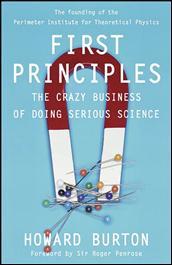
First Principles: The Crazy Business of Doing Serious Science by Howard Burton
Published by Key Porter Books
WorldCat • LibraryThing • Google Books • BookFinder
Having met Howard Burton a number of times and getting to know his clear focus and overarching personal candour, this book presents a very personal story of building the Perimeter Institute for Theoretical Physics (PI) in Waterloo, ON. Overall, what emerges is a rare synergy between two remarkable individuals, Mike Lazaridis the philanthropist and Howard Burton charged to define and implement the fledgling Institute, who were singularly unafraid to break all existing rules and assumptions around what a Physics Institute should be like.
The somewhat rebellious social entrepreneurship both of Burton and philanthropist Mike Lazaridis shine through. Clearly such intense candour can be incendiary in a small town like Waterloo. In fact, what emerged when I saw Howard speak this week at his local book signing, was to underscore my sense that the pride and unique sense of community of Waterloo was absolutely essential to PI’s success. Paradoxically, taken to an extreme, this same pride can easily morph into the risk averse conservatism of a small town. Generally, Waterloo masters this balance, between pride and risk aversion, well, but both forces are at work, and my suspicion is that was always a major balancing act for Howard, being originally from Toronto and having worked globally before being parachuted into Waterloo to create and run PI.
Furthermore, although advancing the boundaries of knowledge, the academic research establishment can be surprisingly hidebound and conservative. I would suggest that without Howard and Mike’s personalities and clear sense of their mission, the whole thing couldn’t have materialized nearly so well. Building PI is a transformational act of future investment that is almost unprecedented in Canada or on the world stage for that matter. This is not dissimilar to why founders of startups aren’t always the right personality to build companies through the later growth stages.
This book really helps to show why PI may well be a major force in twenty-first century scientific advancement. And, considering Howard Burton’s age, I’m really curious what he’ll choose to do for an encore. Furthermore, I hope PI’s example will inspire more large scale social entrepreneuriship in Canada.
14 Oct 2010
0 Comments[Book Review]: First Principles: The Crazy Business of Doing Serious Science
First Principles: The Crazy Business of Doing Serious Science by Howard Burton
Published by Key Porter Books
WorldCat • LibraryThing • Google Books • BookFinder
Having met Howard Burton a number of times and getting to know his clear focus and overarching personal candour, this book presents a very personal story of building the Perimeter Institute for Theoretical Physics (PI) in Waterloo, ON. Overall, what emerges is a rare synergy between two remarkable individuals, Mike Lazaridis the philanthropist and Howard Burton charged to define and implement the fledgling Institute, who were singularly unafraid to break all existing rules and assumptions around what a Physics Institute should be like.
The somewhat rebellious social entrepreneurship both of Burton and philanthropist Mike Lazaridis shine through. Clearly such intense candour can be incendiary in a small town like Waterloo. In fact, what emerged when I saw Howard speak this week at his local book signing, was to underscore my sense that the pride and unique sense of community of Waterloo was absolutely essential to PI’s success. Paradoxically, taken to an extreme, this same pride can easily morph into the risk averse conservatism of a small town. Generally, Waterloo masters this balance, between pride and risk aversion, well, but both forces are at work, and my suspicion is that was always a major balancing act for Howard, being originally from Toronto and having worked globally before being parachuted into Waterloo to create and run PI.
Furthermore, although advancing the boundaries of knowledge, the academic research establishment can be surprisingly hidebound and conservative. I would suggest that without Howard and Mike’s personalities and clear sense of their mission, the whole thing couldn’t have materialized nearly so well. Building PI is a transformational act of future investment that is almost unprecedented in Canada or on the world stage for that matter. This is not dissimilar to why founders of startups aren’t always the right personality to build companies through the later growth stages.
This book really helps to show why PI may well be a major force in twenty-first century scientific advancement. And, considering Howard Burton’s age, I’m really curious what he’ll choose to do for an encore. Furthermore, I hope PI’s example will inspire more large scale social entrepreneuriship in Canada.